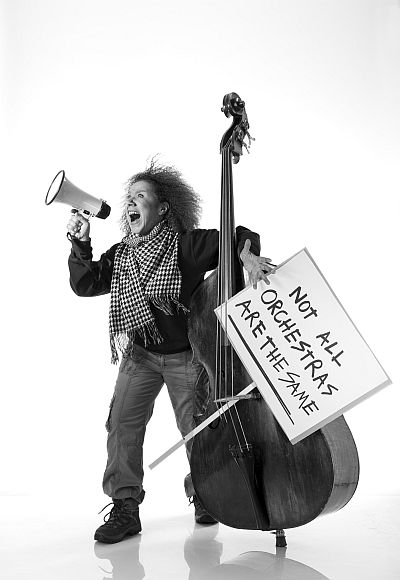 United Kingdom Telemann, Wishart, Handel. Chi-chi Nwanoku (double bass), Frances Kelly (harp), Elizabeth Kenny (lute), Orchestra of the Age of Enlightenment/Kati Debretzeni (director/violin), Queen Elizabeth Hall, Southbank Centre, London. 12.5.2015 (LB)
United Kingdom Telemann, Wishart, Handel. Chi-chi Nwanoku (double bass), Frances Kelly (harp), Elizabeth Kenny (lute), Orchestra of the Age of Enlightenment/Kati Debretzeni (director/violin), Queen Elizabeth Hall, Southbank Centre, London. 12.5.2015 (LB)

Telemann – Overture Burlesque
Concerto for violin in B flat major, TWV 51:B1
Stevie Wishart – The Rough with the Smooth: Concerto à Double Entendre (world premiere)
Handel – Sonata à Cinque in B flat, HWV 288
Concerto for harp and lute, Op.4 No.6, HWV 294
Concerto Grosso in G, Op.6 No.1
The Orchestra of the Age of Enlightenment’s concert at the Queen Elizabeth Hall on Tuesday evening started at the unusual time of 7:00pm, and my mad dash, after work, through London’s chaotic rush hour traffic ended in failure; I arrived just as the doors to the auditorium closed.
To miss the first item on the programme, especially after such a superlative effort, was profoundly disappointing, but being able to view the orchestra’s performance of Telemann’s Overture, Burlesque, on the monitors in the foyer was some compensation. It all looked convincingly energetic, and it was a relief finally to be admitted to the hall, to hear the orchestra’s director, Kati Debretzeni, address the audience before she launched into Telemann’s Violin Concerto in B flat.
Debretzeni is a force to be reckoned with, and her fluent performance brought elegance and fire to Telemann’s charming violin concerto. The orchestra’s accompaniment was sensitive and idiomatic, though all eyes and ears were inexorably drawn to the brilliance of the solo line.
The world premiere of Stevie Wishart’s Concerto for double bass, the centerpiece of the orchestra’s programme this evening presented a conceptual dilemma; an orchestra devoted to the performance of music of the 18th Century, on period instruments, performing a 21st Century creation. The principal question however was how the composer would execute her brief, addressing the future through the rear view mirror.
The Rough with the Smooth: Concerto à Double Entendre is a joint commission for Chi-chi Nwanoku and the Orchestra of the Age of Enlightenment and Robert Nairn and the Handel & Haydn Society.
Whilst the double bass is undoubtedly intended to be the principal solo instrument, Concerto à Double Entendre, in three movements, is loosely in the form of a baroque Concerto Grosso, and is scored for two concertante groups that include a solo violin, harp and lute, with the rest of the orchestra providing a frugal ripieno.
The melodic material is based upon the open strings of the bowed instruments and whilst each movement is ostensibly framed within conventional Baroque structures – a Prelude and Fugue, Air and Passacaglia respectively – a central component of the composition is the scope it provides for improvisation. Stevie Wishart’s programme note for the concerto was as comprehensive as it was thorough, but identifying a meaningful connection between her intellectual rationale and the music we were hearing proved challenging.
Double bassist Chi-chi Nwanoku’s charismatic performance proved to be decisive, however, in maintaining a level of engagement in a texturally monochromatic and rhythmically repetitious work that sounded in danger of running out of momentum and inspiration. As the performance meandered to its conclusion I began to have my doubts about whether the original conceptual dilemma had been satisfactorily addressed, and also if the potential for a new double bass concerto had been effectively exploited.
After the interval the orchestra returned to more familiar territory, with three engaging pieces by George Frederick Handel. Debretzeni was at her enchanting best once again in the Sonata à Cinque, and the Concerto for harp and lute in B flat is one most music lovers would recognise in its subsequent guise as an organ concerto. Harpist Frances Kelly and the lutenist, Elizabeth Kenny performed their solo parts with conviction and made a credible case for Thurston Dart’s reconstruction of the original.
The Concerto Grosso in G Op.6 No.1 represents Handel at his most ebullient and the Orchestra of the Age of Enlightenment succinctly captured the essence of the music.
Leon Bosch